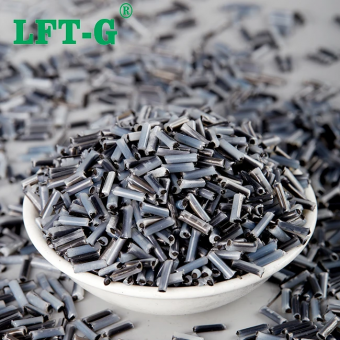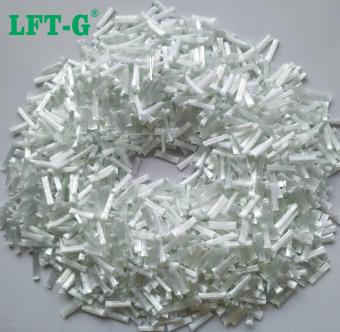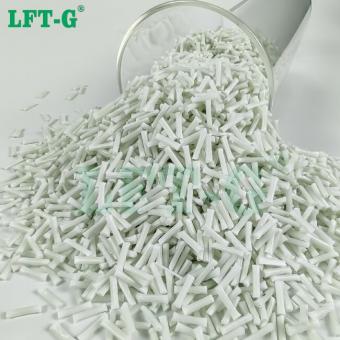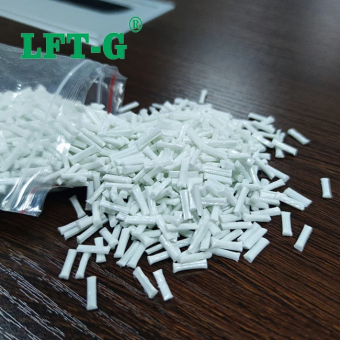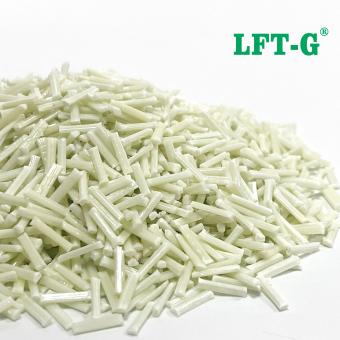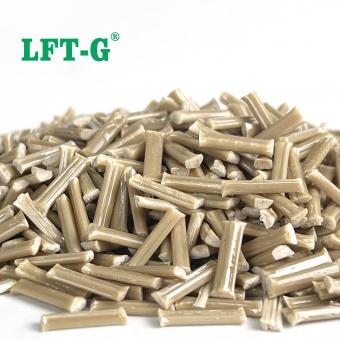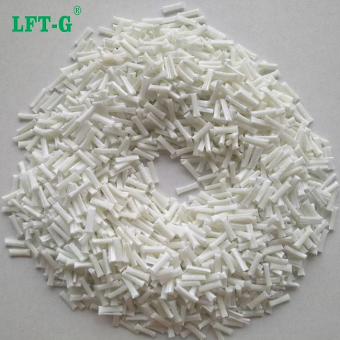-
LFT HDPE LGF40 Glass Fiber Reinforced Composite For PipeProduct Name:HDPE LGF40, High Density Polyethylene LGF40,Long Glass Fiber Fill HDPE Form: High Impact Toughness, Chemical Resistance, And High Dimensional Stability Advantage:A special laboratory for testing
- HDPE LGF40
- LFT HDPE Composite
- High Density Polyethylene LGF40
- Long Glass fiber Fill HDPE
- High Tensile Strength HDPE GF40
- HDPE Glass Fiber Reinforced Plastic
Tags :
-
LFT-G HDPE filling long glass fiber high toughness and stiffness modified plastic for shellHDPE Introduction High-density polyethylene is an opaque white waxy material, lighter than water, specific gravity of 0.941 ~ 0.960, soft and tough, but slightly harder than LDPE, but also slightly elongated, non-toxic, odorless. Flammable, can continue to burn after leaving the fire, the upper end of the flame is yellow, the lower end is blue, will melt when burning, there are liquid drops, no black smoke, at the same time, emitting the smell of paraffin wax when burning. Acid and alkali resistance, organic solvent resistance, excellent electrical insulation, low temperature, can still maintain a certain degree of toughness. Surface hardness, tensile strength, rigidity and other mechanical strength are higher than LDPE, close to PP, tougher than PP, but the surface finish is not as good as PP. Poor mechanical properties, poor air permeability, easy to deformation, easy to aging, easy to brittle, brittle than PP, easy stress cracking, low surface hardness, easy to scratch. Difficult to print, when printing, surface discharge treatment is required, can not be plated, and the surface is not glossy. HDPE-Long glass fiber Because of its high crystallinity, poor impact strength and environmental cracking resistance and other defects, limiting its scope of application, so a lot of toughening modification HDPE research work has been carried out at home and abroad. Our company has greatly improved the performance of HDPE through the way of co-blending modification. Long fiber reinforced thermoplastic composites are reinforced thermoplastics with fiber lengths greater than 10mm. The reinforcing fibers are mainly glass fibers, carbon fibers, etc. Depending on the type of resin with appropriate fiber surface treatment, better results can be achieved. The addition of fiber material to the resin can greatly improve the overall material performance. Fiber composites absorb external forces in three ways: fiber pullout, fiber breakage, and resin fracture. The increase of fiber length consumes more energy for fiber pull-out, which is beneficial to the improvement of impact strength; the end of fiber in the composite is often the initiation point of crack growth, and the small number of long fiber ends also makes the impact strength increase; the long fiber blends entangle, flip and bend each other when filling the mold, unlike the short fiber blends which are arranged in the flow direction, therefore, the long fiber blends molded products are better than the same molded parts of short fiber blends. Therefore, compared with the same molded parts of short fiber blends, the long fiber blends have higher isotropy, better straightness, less warpage, and therefore better dimensional stability; the heat deflection temperature of long fiber reinforced thermoplastics is also increased than that of short fiber blends. Therefore, long-fiber composites exhibit better performance than short-fiber composites, which can improve rigidity, compression strength, bending strength, and creep resistance. Process TDS for your reference Tests Certifications Quality Management System ISO9001/16949 Certification National Laboratory Accreditation Certificate Modified Plastics Innovation Enterprise Honorary Certificate Heavy metal REACH & ROSH testing Application We will provide technical supports according to your product's images. About us We will offer you: 1. LFT & LFRT material technical parameters and leading edge design. 2. Mold front design ang recommendations. 3. Provide technical support such as injection molding and extrusion molding. Frequently asked questions Q: How to choose the reinforcement method and length of the material when using long fiber reinforced thermoplastic material? A: The selection of materials depend on the requirements of products. It is necessary to assess how much the content is reinforced and how much length is more appropriate, which are depending on the performance requirements of the products. Q: In addition to being suitable for injection molding, long fiber products can be extruded or other processes? A: LFT long glass fiber and long carbon fiber are mainly used for injection molding, and can also extrusion plate profile tube and mold edges a variety of thermoplastic molding methods. Q: The cost of long fiber products is higher than raw materials. Does it has a high recycling value? A: The thermoplastic LFT long fiber material can be recycled and reused very well.
- long glass fiber HDPE
- long fibre reinforced thermoplastics
- glass fiber reinforced plastics granules
- LFT composite
- HDPE LGF
- Glass fiber fill hdpe
Tags :
-
Xiamen LFT-G HDPE filling long glass fiber high toughness stiffness modified pellets for shellHDPE Introduction High-density polyethylene is an opaque white waxy material, lighter than water, specific gravity of 0.941 ~ 0.960, soft and tough, but slightly harder than LDPE, but also slightly elongated, non-toxic, odorless. Flammable, can continue to burn after leaving the fire, the upper end of the flame is yellow, the lower end is blue, will melt when burning, there are liquid drops, no black smoke, at the same time, emitting the smell of paraffin wax when burning. Acid and alkali resistance, organic solvent resistance, excellent electrical insulation, low temperature, can still maintain a certain degree of toughness. Surface hardness, tensile strength, rigidity and other mechanical strength are higher than LDPE, close to PP, tougher than PP, but the surface finish is not as good as PP. Poor mechanical properties, poor air permeability, easy to deformation, easy to aging, easy to brittle, brittle than PP, easy stress cracking, low surface hardness, easy to scratch. Difficult to print, when printing, surface discharge treatment is required, can not be plated, and the surface is not glossy. HDPE-Long glass fiber Because of its high crystallinity, poor impact strength and environmental cracking resistance and other defects, limiting its scope of application, so a lot of toughening modification HDPE research work has been carried out at home and abroad. Our company has greatly improved the performance of HDPE through the way of co-blending modification. Long fiber reinforced thermoplastic composites are reinforced thermoplastics with fiber lengths greater than 10mm. The reinforcing fibers are mainly glass fibers, carbon fibers, etc. Depending on the type of resin with appropriate fiber surface treatment, better results can be achieved. The addition of fiber material to the resin can greatly improve the overall material performance. Fiber composites absorb external forces in three ways: fiber pullout, fiber breakage, and resin fracture. The increase of fiber length consumes more energy for fiber pull-out, which is beneficial to the improvement of impact strength; the end of fiber in the composite is often the initiation point of crack growth, and the small number of long fiber ends also makes the impact strength increase; the long fiber blends entangle, flip and bend each other when filling the mold, unlike the short fiber blends which are arranged in the flow direction, therefore, the long fiber blends molded products are better than the same molded parts of short fiber blends. Therefore, compared with the same molded parts of short fiber blends, the long fiber blends have higher isotropy, better straightness, less warpage, and therefore better dimensional stability; the heat deflection temperature of long fiber reinforced thermoplastics is also increased than that of short fiber blends. Therefore, long-fiber composites exhibit better performance than short-fiber composites, which can improve rigidity, compression strength, bending strength, and creep resistance. Process TDS for your reference Tests Certifications Quality Management System ISO9001/16949 Certification National Laboratory Accreditation Certificate Modified Plastics Innovation Enterprise Honorary Certificate Heavy metal REACH & ROSH testing Application We will provide technical supports according to your product's images. About us We will offer you: 1. LFT & LFRT material technical parameters and leading edge design. 2. Mold front design ang recommendations. 3. Provide technical support such as injection molding and extrusion molding. Frequently asked questions Q: How to choose the reinforcement method and length of the material when using long fiber reinforced thermoplastic material? A: The selection of materials depend on the requirements of products. It is necessary to assess how much the content is reinforced and how much length is more appropriate, which are depending on the performance requirements of the products. Q: In addition to being suitable for injection molding, long fiber products can be extruded or other processes? A: LFT long glass fiber and long carbon fiber are mainly used for injection molding, and can also extrusion plate profile tube and mold edges a variety of thermoplastic molding methods. Q: The cost of long fiber products is higher than raw materials. Does it has a high recycling value? A: The thermoplastic LFT long fiber material can be recycled and reused very well.
- long glass fiber HDPE instead metal and steel
- LFT composite PE for pipe undergrund
- HDPE LGF sample available injection mold
- Glass fiber fill hdpe virgin grade
Tags :

 e-mail
e-mail English
English français
français Deutsch
Deutsch русский
русский italiano
italiano español
español português
português العربية
العربية 日本語
日本語 한국의
한국의 中文
中文





